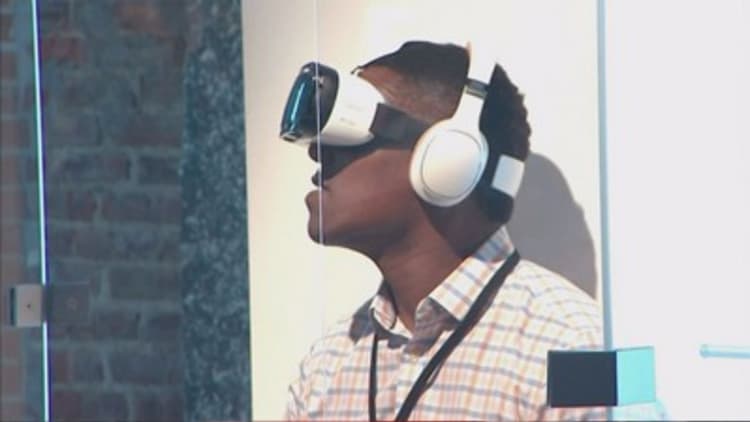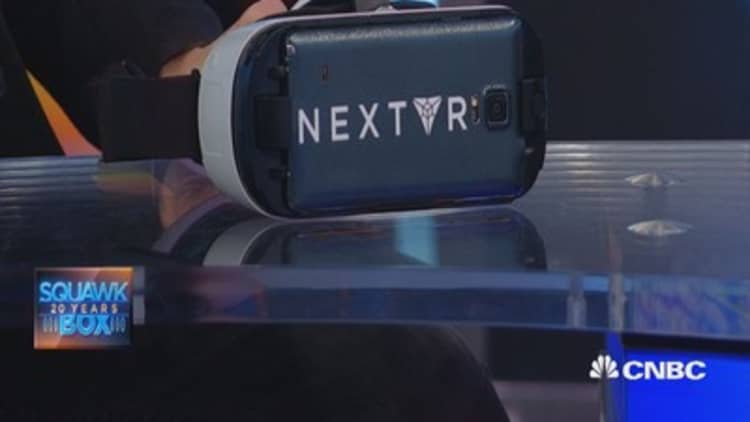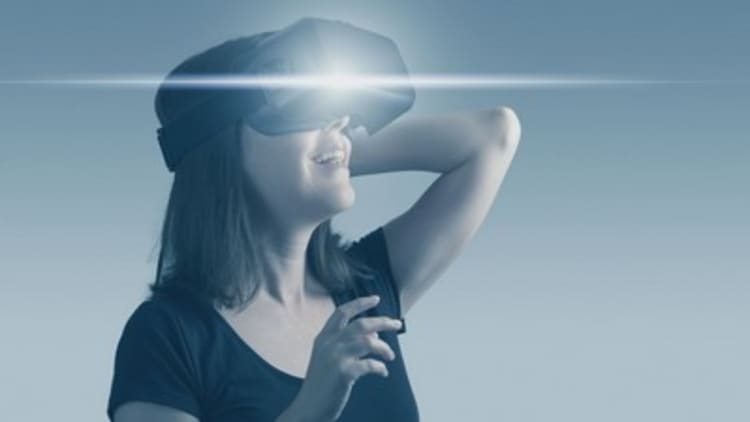On the heels of Samsung's Gear VR selling out over the holidays, virtual reality is set to take off in 2016, as Facebook's Oculus and Sony's PlayStation launch their highly anticipated hardware.
Presales of the Oculus VR headset start on Wednesday, and demand has been stronger than many expected.
A new study from Magid Advisors found that nearly half of all Americans who play video games were interested in at-home VR. And the market of gamers is huge — 70 percent of Americans play games on their phone or console, according to Magid.
Of the VR providers, the study found that Oculus Rift had the highest awareness among gamers, with 25 percent, followed by Samsung Gear VR, and then Sony Morpheus, with Google Cardboard in the rear, with just 17 percent awareness.
Given that Oculus Rift hasn't gone on sale yet, and Google Cardboard launched in December 2014, this shows the strength of demand for the Oculus headset that's designed for serious gamers to hook up to a PC.
Read More Oculus Rift finally goes on sale with mystery price tag

"This is even higher than I expected," Magid Advisors president Mike Vorhaus said. "You don't need to get anywhere near the number of people who said they're interested to have a very successful launch."
The study also contained a surprise that indicates VR's broad potential beyond gaming. It found that the most desired type of VR content was entertainment rather than gaming. A full two-thirds of respondents said they were interested in movies and TV content. Console and PC gaming drew 59 percent of respondents.
For this reason, traditional content producers will invest in VR this year, to stake a claim in a market that's expected to generate $150 billion in revenue by 2020.
On Tuesday, Fox will unveil its latest push into VR, launching "The Martian Experience," a VR adventure that's tied to last fall's film "The Martian."
Fox has led Hollywood's push into VR; its Fox Innovation Lab produced a VR movie based on the film "Wild" last year, and it has partnered with Oculus to distribute titles in its movie library. Fox has made a significant commitment to VR, with plans for three additional VR experiences.
Two of the new projects will be designed for the lower-cost mobile headsets, such as Samsung's Gear VR.

For now, Fox's VR content is tied to Fox films, but eventually could be stand-alone intellectual property. And while these experiences will be available to anyone who invests in a headset, it's easy to imagine movie theaters offering moviegoers the option to pay for a related VR experience after leaving a film.
What's key about the 22-minute long "Martian Experience," is that it was not designed to simply be a promotion for the film, said Mike Dunn, president of 20th Century Fox Home Entertainment.
"In order for this media to be realized, there has to actually be content for sale," Dunn said. "We want to design content someone would want to own, you want to experience it a number of times. I don't think a one-time view does it justice."
Fox will decide how to price this "experience," which will be made available for Sony and Oculus headsets, later this year, after getting a sense of the competition at the electronics trade show CES and the Sundance Film Festival.

Fox is not alone in seeing potential in VR: Netflix, Hulu and DirecTV have all launched VR apps, among the hundreds available in Oculus' app store and the dozens available for Cardboard's $20 headset. On Monday, NBC Universal's Syfy announced an innovation lab dedicated to creating immersive VR content.
And a number of traditional content companies are pushing the lower-cost Cardboard headset to get consumers hooked on VR, and their VR content. The New York Times gave out a million free Cardboard headsets with the launch of its VR app in the fall, while Verizon partnered with "Star Wars" to give out headsets for the launch of its VR app in December.
The media giants, as well as venture capital firms, are also placing bets on which content start-ups will take off. Disney has invested in Jaunt, Comcast and Time Warner in NextVR. In total, over half a billion dollars was invested last year in the virtual reality startups.
And Magid's Vorhaus is sure we'll see more investment, and much more content: "You wouldn't dream of watching TV today without an HDTV, so I imagine for the right content, people wouldn't dream of watching that content if it wasn't on VR."
Disclosure: Comcast owns CNBC parent NBCUniversal and is a co-owner of Hulu.


